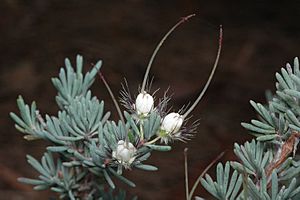Blue spruce vertiordia facts for kids
Quick facts for kids Blue spruce verticordia |
|
|---|---|
 |
|
| Conservation status | |
| Scientific classification |
|
| Kingdom: | Plantae |
| Clade: | Tracheophytes |
| Clade: | Angiosperms |
| Clade: | Eudicots |
| Clade: | Rosids |
| Order: | Myrtales |
| Family: | Myrtaceae |
| Genus: | Verticordia |
| Subgenus: | Verticordia subg. Verticordia |
| Section: | Verticordia sect. Infuscata |
| Species: |
V. longistylis
|
| Binomial name | |
| Verticordia longistylis A.S.George
|
|
| Script error: The function "autoWithCaption" does not exist. | |
Script error: No such module "Check for conflicting parameters".
The Blue Spruce Verticordia (scientific name: Verticordia longistylis) is a beautiful flowering plant. It belongs to the myrtle family, called Myrtaceae. This plant is special because it only grows in the south-west part of Western Australia. It's a shrub with branches that grow in different directions. Its leaves are a pretty bluish-grey. The flowers are light-colored and have a very long part sticking out, called a style. Even though you don't see many of these plants in nature, they are quite easy to grow from seeds or cuttings.
What it Looks Like
The Blue Spruce Verticordia is a shrub that usually grows between 10 cm (4 in) and 70 cm (30 in) tall. It can spread out to about 70 cm (30 in) wide. Its leaves are thick and have a bluish-green color. They are shaped like thin lines, about 4 mm (0.2 in) to 10 mm (0.4 in) long, and have a rounded end.
The flowers don't have a strong smell and are not very noticeable. They grow on stalks that are about 4 mm (0.2 in) to 5 mm (0.2 in) long. The base of the flower, called the floral cup, is shaped like half a ball. It's about 5 mm (0.2 in) long and feels bumpy and hairy, especially at the bottom.
The sepals, which are like small leaves protecting the flower, are yellow and purple. They are about 6 mm (0.2 in) to 7 mm (0.3 in) long and also hairy. The petals are creamy or yellowish and shaped like an egg. They stand upright and are slightly cupped. Their edges are covered with tiny hairs. The most unique part is the style, which is very long. It measures about 27 mm (1.1 in) to 32 mm (1.3 in) and has a few hairs on it. This plant usually blooms from December to June.
Name and History
The Blue Spruce Verticordia was first officially described in 1991. A scientist named Alex George found a sample of the plant in the Fitzgerald River National Park. He then wrote about it in a science journal called Nuytsia.
Alex George gave the plant its specific name, longistylis. This name comes from two Latin words: longus, meaning "long," and stylus, referring to the plant's style. He chose this name because its style is the longest among all plants in its group.
Where it Lives
This type of verticordia plant grows in a special kind of soil called spongolite. You can find it in areas where the ground is exposed, mostly within the Fitzgerald River National Park. This park is located in a part of Western Australia known as the Esperance Plains.
Protecting the Plant
The Western Australian Government's Department of Parks and Wildlife has given Verticordia longistylis a special classification. It is listed as "Priority Three". This means that not much is known about the plant, and it's only found in a few places. However, it is not currently in immediate danger of disappearing.
Growing it at Home
The Blue Spruce Verticordia is quite easy to grow from cuttings. It can grow in different types of soil. If you plant it in sandy soil, it might grow a bit slower and look more open. Once the plants are established, they can handle both frost and dry weather. If they start to look a bit messy, you can prune them to keep them neat. The flowers are not very showy unless you look at them up close. However, many people find the bluish leaves very attractive.


